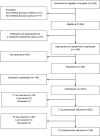Predictors of enduring clinical distress in women with breast cancer
- PMID: 27417105
- PMCID: PMC4963436
- DOI: 10.1007/s10549-016-3896-7
Predictors of enduring clinical distress in women with breast cancer
Abstract
To date, little is known about enduring clinical distress as measured with the commonly used distress thermometer. We therefore used the distress thermometer to examine: (a) the prevalence of enduring clinical distress, distress-related problems, and subsequent wish for referral of women with breast cancer, and (b) sociodemographic, clinical, and psychosocial predictors of enduring clinical distress. The study had a multicenter, prospective, observational design. Patients with primary breast cancer completed a questionnaire at 6 and 15 months postdiagnosis. Medical data were retrieved from chart reviews. Enduring clinical distress was defined as heightened distress levels over time. The prevalence of enduring clinical distress, problems, and wish for referral was examined with descriptive analyses. Associations between predictors and enduring clinical distress were examined with multivariate analyses. One hundred sixty-four of 746 patients (22 %) reported having enduring clinical distress at 6 and 15 months postdiagnosis. Of these, 10 % wanted to be referred for care. Fatigue was the most frequently reported problem by patients with and without clinical distress, at both time points. Lack of muscle strength (OR = 1.82, 95 % CI 1.12-2.98), experience of a low level of life satisfaction (OR = 0.77, 95 % CI 0.67-0.89), more frequent cancer worry (OR = 1.40, 95 % CI 1.05-1.89), and neuroticism (OR = 1.09, 95 % CI 1.00-1.18) were predictors of enduring clinical distress. In conclusion, one in five women with breast cancer develops enduring clinical distress. Oncologists, nurse practitioners, and cancer nurses are advised to use single-item questions about distress and distress-related problems to ensure timely detection of high-risk patients. Providers should also routinely assess fatigue and its causes, as fatigue is the most frequently reported distress-related problem over time.
Keywords: Breast cancer; Distress; Distress thermometer; Referral.
Figures
Similar articles
-
Distress, problems, referral wish, and supportive health care use in breast cancer survivors beyond the first year after chemotherapy completion.Support Care Cancer. 2020 Jul;28(7):3023-3032. doi: 10.1007/s00520-019-05030-6. Epub 2019 Sep 11. Support Care Cancer. 2020. PMID: 31511981 Free PMC article.
-
Patients with oesophageal cancer report elevated distress and problems yet do not have an explicit wish for referral prior to receiving their medical treatment plan.Psychooncology. 2017 Apr;26(4):452-460. doi: 10.1002/pon.4161. Epub 2016 Jun 1. Psychooncology. 2017. PMID: 27246192
-
Distress screening remains important during follow-up after primary breast cancer treatment.Support Care Cancer. 2013 Aug;21(8):2107-15. doi: 10.1007/s00520-013-1764-0. Epub 2013 Mar 1. Support Care Cancer. 2013. PMID: 23455455
-
Association between socioeconomic status and altered appearance distress, body image, and quality of life among breast cancer patients.Asian Pac J Cancer Prev. 2014;15(20):8607-12. doi: 10.7314/apjcp.2014.15.20.8607. Asian Pac J Cancer Prev. 2014. PMID: 25374176
-
The psychosocial experiences of women with breast cancer across the lifespan: a systematic review protocol.JBI Database System Rev Implement Rep. 2015 Jan;13(1):112-21. doi: 10.11124/jbisrir-2015-1795. JBI Database System Rev Implement Rep. 2015. PMID: 26447012
Cited by
-
Incidence and risk factors for psychological distress in adult female patients with breast cancer: a systematic review and meta-analysis.Front Psychiatry. 2024 Mar 13;15:1309702. doi: 10.3389/fpsyt.2024.1309702. eCollection 2024. Front Psychiatry. 2024. PMID: 38544846 Free PMC article. Review.
-
The predictive role of intolerance of uncertainty and trait of worry in breast cancer patients: A prospective, observational, single-center clinical study.Front Psychol. 2023 Apr 17;14:1092060. doi: 10.3389/fpsyg.2023.1092060. eCollection 2023. Front Psychol. 2023. PMID: 37138973 Free PMC article.
-
Psychological Distress Among Women With Breast Cancer in Saudi Arabia: A Phenomenological Study.Cureus. 2024 Sep 19;16(9):e69701. doi: 10.7759/cureus.69701. eCollection 2024 Sep. Cureus. 2024. PMID: 39429287 Free PMC article.
-
Psychological Aspects to Consider in Breast Cancer Diagnosis and Treatment.Curr Oncol Rep. 2021 Mar 11;23(3):38. doi: 10.1007/s11912-021-01049-3. Curr Oncol Rep. 2021. PMID: 33709235 Free PMC article. Review.
-
Feasibility and Relevance of an Intervention with Systematic Screening as a Base for Individualized Rehabilitation in Breast Cancer Patients: A Pilot Trial of the ReScreen Randomized Controlled Trial.J Multidiscip Healthc. 2022 May 10;15:1057-1068. doi: 10.2147/JMDH.S355055. eCollection 2022. J Multidiscip Healthc. 2022. PMID: 35586080 Free PMC article.
References
Publication types
MeSH terms
LinkOut - more resources
Full Text Sources
Other Literature Sources
Medical



